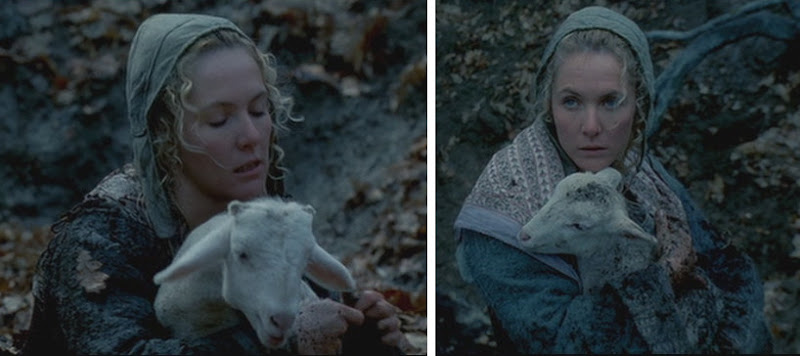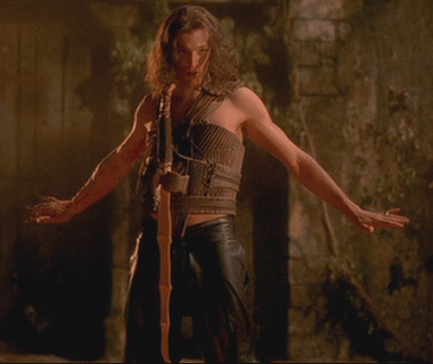So, where do we want to start with the brutal spoilers? Oh, let's just jump right into the racism. You can pretty much sum that up with "Super-Dooper Magical Injun Powers" courtesy of Mani. Try to figure out why Mani and Fronsac, our hero, are blood brothers. From what we're told in movie, it seems to boil down to "well, I tried to kill him and didn't do a very good job, and then I felt kinda bad about it, so here we are."
Now of course, you do realize that the Native American will not be allowed to finish the movie alive, right? I mean, that simply isn't done; happy endings are a white-folks-only club, right? Unfortunately, killing Mani is kind of hard because his Super-Duper Magical Injun Powers make him hyper-competent. So, the writers just take that away for no reason. He just spontaneously loses his competence in the middle of a fight. What makes this especially bad is that Mani already fought the exact same fight earlier in the movie, down to the same participants. Yet for some reason in the first fight no one could even touch him, and now he's getting his ass kicked right up until he gets shot.
By the way. If you're ever part of a super secret conspiracy that kills people several times a month, may I suggest that you not use an extremely distinctive one-of-a-kind bullet to do so? And that you especially not brag about using them to "sign your shots"? That little slice of stupid is cause to revoke someone's villain license all on its own. Also, the ballistics of a silver bullet suck horribly. Geeky types have tested this several times. Silver bullets just don't have the weight or dimensional stability during casting to be effective.
The racism's pretty bad, but you can kind of turn your head and pretend you didn't see it or tell yourself that maybe they were at least trying. Let's be honest. We've all had to learn to do that somewhat with movies if we ever want to watch any of them, because there's so much of this stuff out there. The sexism is a similar story, except worse. We have a monster that attacks only women and children. They specifically say that it avoids men. Gee, thanks movie. And of course that means every once in a while we get to watch a woman be brutally slaughtered by a large CGI animal. Lovely. Then there's the feral gypsy woman who I don't think ever actually has a speaking line -- but sure gives a lot of lusty grunts. Why was she even there? You could easily take her out of the movie without losing anything at all. Then, just because apparently we haven't brutalized enough women yet, at 2 hours into a 2 and a half hour movie they suddenly decide to introduce an incest subplot and subsequent rape. Again, thanks, movie.
Even if it weren't for the serious issues above, the movie would still hurt. They tried much too hard with the cinematography, the plotting goes goofy halfway through, there are continuity errors galore, and our villain's unbelievable idiocy reduced me to hysterical laughter in the final battle.
You know the fight scenes from 300? Imagine an entire movie filmed that way. That is basically Brotherhood of the Wolf. There are maybe 20 minutes of love story break from that, but even that's filled with lots of blatant, sometimes dizzying, camera moves. Oh, let me tell you, the director loved his dolly cam. The movie is often described as "visually stunning". I can't argue with that, but if you've ever studied art, you've learned that the negative space can be just as important as the meat of the image. That's just as true in a movie, and this one never gives your eyes a chance to rest from the constant movement and pace changes.
Then there's the CGI. This monster is supposed to be a lion (snert) in armor. Maybe they could try designing armor that was physically possible, could work without remote control technology that's still 200 years off, and could conceivably be worn by a lion? Maybe even build a mock-up and use it for some shots. You know, seeing as how it was 2001 and the ability to convincingly composite CGI with live footage was still quite horrible. ("Makeup! Can we get some mud on our monster, please? And maybe a little blood? This thing is supposed to have been running around the French countryside during rainy season slaughtering maidens left and right, and the hose hasn't been invented yet.")
And of course, fight scene after fight scene after almost identical fight scene. By the time we got to Mani's great loss of competence, my reaction was a sarcastic "oh, this is good, because it's completely not like every other shot in the movie." Honestly, I think they have 30 minutes of main plot, 20 minutes of sub plot, and the rest of the 2 hours 30 minutes is near-identical fight scenes and women being brutally slaughtered by a lion in a stegosaurus suit.
Then there's the plotting. It starts out OK, except that they don't get around to introducing any significant hint of a conspiracy until halfway through. They should have introduced that "the beast is proof the King is an idiot" book at the beginning as a reason for our hero to be here. It would work much better than "well, this thing's been running around for going on 3 years without us even coming close to catching it, but we're sure this is our year so the hero should be here to preserve it when we do." Nope, no conspiracy until halfway through. Then half an hour later the writers decide a simple conspiracy just isn't enough and start twisting it into bizarre knots. And of course they feel a need to suddenly introduce an incest subplot for the first time at the 120 minutes out of 150. BTW, what the hell was up with Jean-Francois's arm? There isn't really any plot-driven reason for him to pretend to have lost his arm. He must have some serious Munchausen Syndrome. "Pity me, I lost my arm to a lion, wah!" And like it wouldn't be atrophied after being tied up in his corset 23 hours a day.
That's a perfect lead-in to the continuity errors. I think my favorite is the magic species changing lamb-goat with a side of self-cleaning peasant dress.

How does an error like that even happen? "OK, we're done adjusting the lighting and and I'd like to redo that reaction take, so cue the goat. ... Oh crap, the goat got a little too close to the trained wolves. Um... Oh, we have this nice lamb we can use. I'm sure no one will notice."
Speaking of "no one will notice", when this shep-goatherd lady shows up, don't be surprised if your reaction is "Hey, you died an hour ago!" Because she was dead about 10 minutes in. This is the dead-woman-turned-bait from Fronsac's introduction. That's how bad the monster is: if you're miraculously restored from the dead, it'll kill you again. (Actually the scenes were rearranged after shooting, and the editors figured that there were so many brutally slaughtered women that surely we wouldn't be able to keep track of them all.)
That's my favorite, but there's some other good ones. How do you feel about impossible metaknowledge? When the beast attacks Fronsac and Marianne at her nanny's place, Fronsac tells Marianne to leave slowly and not run, and in the meantime he jumps around like a flea on crack to keep the animals' attention focused on him. That is indeed a good course of action with a lion if you're trying to keep it from eating your girlfriend; at close distance, felines detect prey by movement. However, there's no way for him to know this thing is feline. This is the first time he's ever seen it, and it's completely covered by armor. Naturalist or not, I find it hard to believe he could identify it that confidently from seeing one leap and 2 steps as it prepared to kill him.
Then there's the flip side of that, the utterly unbelievable lack of knowledge. This lion in armor has been running around slaughtering women for three years in all seasons, including snowy winters. Am I seriously to believe it's never left a damn pawprint? Because that would have made it very obvious very fast that it wasn't a wolf.
Now, maybe all of this could still have been rolled into a good movie if only we had a powerful, competent villain. Unfortunately, we have Jean-Francois. Yeah, the guy who hides his arm under a man-corset, develops uncontrollable incestuous lust at the last minute, and uses the incredibly distinctive bullets he bragged about to off people for a super-secret conspiracy. You know, his brain just sort of falls out of his head 3/4 of the way through the movie. He's perfectly fine, even kind of cool, throughout most of the movie and then suddenly he's off in skoodily-woodily land.
Then there's his death. His abso-freaking-lutely hilarious point-and-laugh-until-you-hyperventiliate death. I'm not sure I can adequately express the sheer hilarity of his death, but I'll give it a go. First, he shows up to the ultimate fight of his life looking like... well, looking like this.

::blinkblink:: What do you even say to that?
Oh, and his weapon of choice is this physics-defying bone-sword-chain-whip thingy. It would actually be kind of cool, except 1) the movie has poured so much effort into its constant "visual stunningness" that this weapon just kind of blends in with the rest of it, and 2) Jean-Francois has little-to-no idea how to actually use it. There was a point in here where I shouted at the screen "Dude, he has blocked you three times with the exact same move! It's time for a different tactic." Then he gets it stuck around Fronsac's arm and dagger. I assume he's supposed to be purposely tossing the hero around, but it looks more like he's trying to get his weapon free and in the process is accidentally rolling Fronsac out of the way of the falling architectural debris that would have crushed him to death and ended this. Well, that's not working, so Jean-Francois gives a good yank, and yanks Fronsac towards him right where Fronsac can just slit his throat. I don't think Fronsac even meant to do it. He just had his second dagger out and Jean-Francois's throat kind of got in the way. Well crud. Now Jean-Francois's throat is cut and he still doesn't have control of his weapon back. So he gives one last good yank and gets his bone-sword-chain-whip back, but in the process yanks Fronsac's first dagger right into his own chest. And that's where I started laughing so hard I hyperventilated. I can't even grant Fronsac the assist on this one. Jean-Francois was killed by the sheer power of his own astounding incompetence. It's only by the grace of God (pardon the pun) that he didn't accidentally off himself while practicing one day.
On a positive note, the actual story of the Beast of Gevaudan is quite interesting. Go read it if you're into that. I especially found the Asian hyena theory interesting.
So, final recommendation for this movie: if you're looking for some DIY riffing fodder and don't mind a strong R rating, this is a perfect candidate. It's not completely painful to watch, but there is plenty of riffing opportunity. If you're looking to disengage your brain and just watch some eye-candy, it's also got potential if you can ignore the racism and sexism and don't ask any pesky questions. If you're asthmatic, however, I suggest you avoid it; the intense laughter could trigger an attack.
